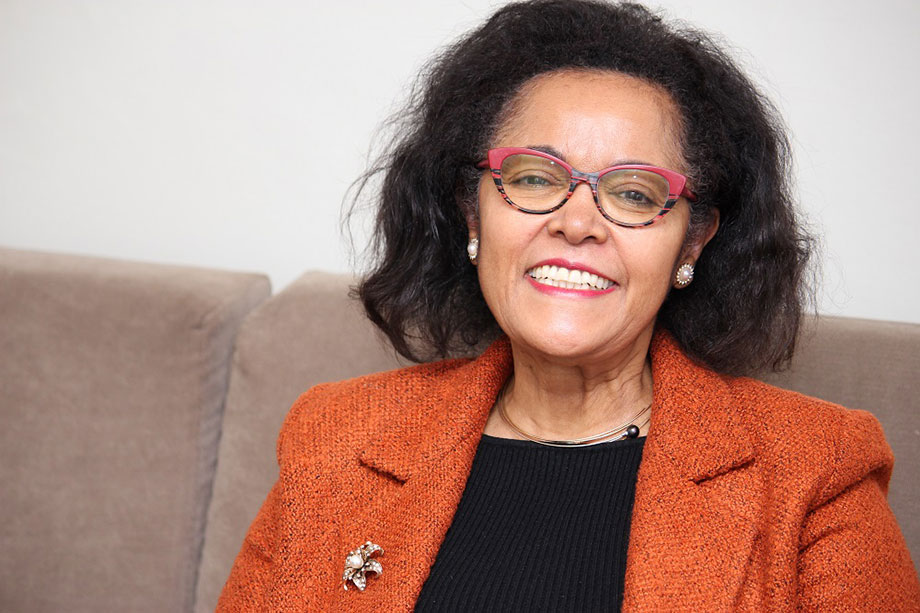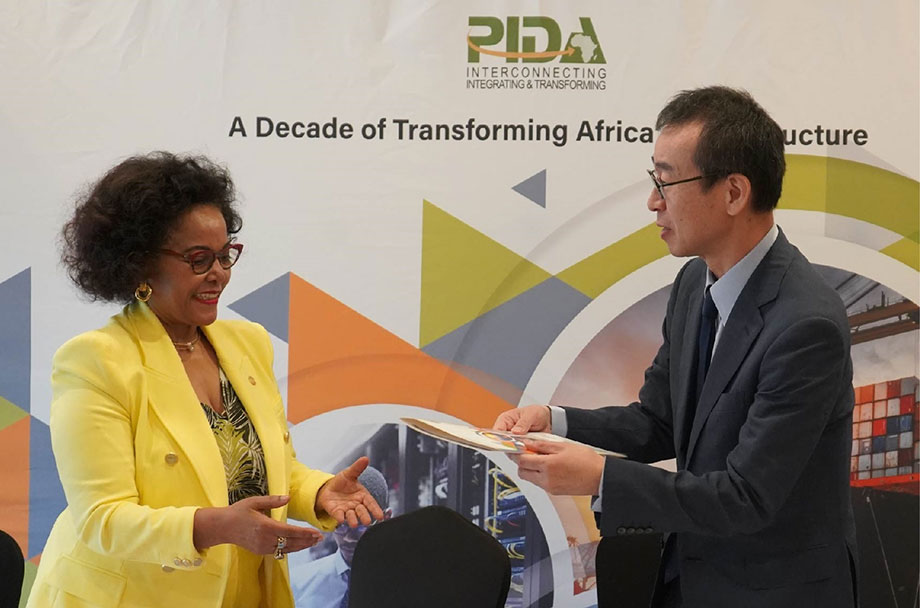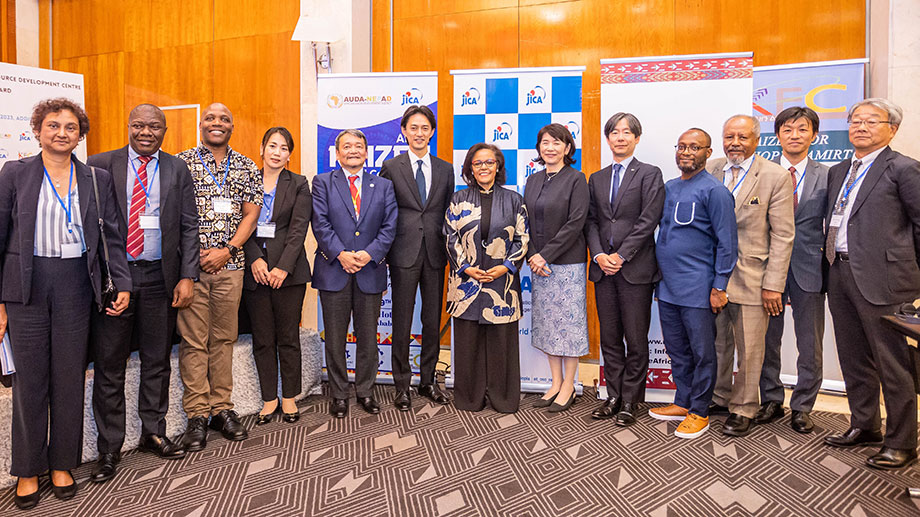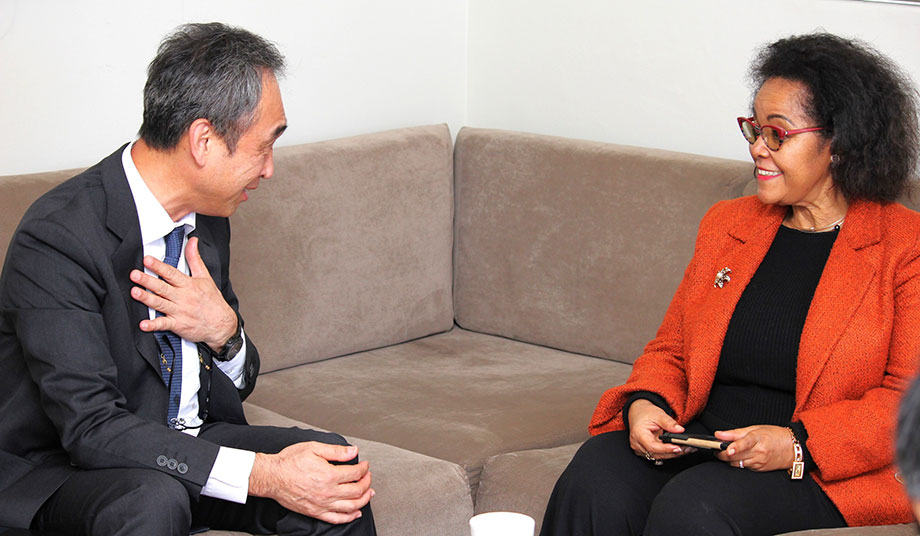[TICAD at 30] Leveraging the capability of Africa’s youth: Interview with the African Union Development Agency (AUDA-NEPAD) CEO, H.E. Ms. Nardos Bekele-Thomas
2024.03.28
The African Union Development Agency (AUDA-NEPAD), the development implementing agency of the African Union, stands as a key partner for TICAD, emphasizing the principle of Africa’s ownership over Africa’s development. AUDA-NEPAD and JICA, which signed a Memorandum of Cooperation in 2014, held an annual consultation conference in the Republic of South Africa last year, where AUDA-NEPAD's headquarters is located. Taking advantage of this opportunity, Mr. Ando Naoki, JICA Senior Vice-President who participated in the conference, interviewed H.E. Ms. Nardos Bekele-Thomas, Chief Executive Officer (CEO) of AUDA-NEPAD, about the work done through TICAD and on empowering and promoting Africa's youth through AUDA-NEPAD’s “Energize Africa” initiative.

H.E. Ms. Nardos Bekele-Thomas, CEO of AUDA-NEPAD
JICA Mr. Ando Naoki:
Today, the annual consultation between AUDA-NEPAD and JICA was held in South Africa for the first time. As we had a frank exchange of views in the morning session, we would like to continue to ask for your frank views here, too. The first question is, as a CEO of AUDA-NEPAD, what is the most important challenge which the African continent is facing now?
AUDA-NEPAD H.E. Ms. Nardos Bekele-Thomas:
I would like to start by reviewing the past decade. In 2013, the African Union adopted “Agenda 2063”, a long-term blueprint for Africa's growth over the next 50 years, which was triggered by the failure to realize the Lagos Plan of Action. Agenda 2063 is a comprehensive continental development plan which places Africa at the helm of its own progress, fostering self-sufficiency, resilience, integration, unity, and a collective commitment to the well-being of the African people.
10 years have passed since the launch of “Agenda 2063“, prompting a need to critically assess and evaluate the progress of this 10-year performance. What was revealed is that the performance of achievement was at the level of 39%, signifying noteworthy achievement. So, what are the remaining challenges for Africa in the coming 10 years? In order to further realize “Agenda 2063”, I think there are three major challenges that Africa has to overcome in the future.
First of all, Africa remains dependent on primary commodities which are often exported without underdoing any value addition within the continent. Industrialization is key to reverse the situation, as enhancing value through processing and manufacturing can significantly impact Africa's economic performance. The terms of trade for Africa are intricately tied to its ability to add value to its commodities, thereby defining the economic growth and performance of the continent.
Secondly, Africa's population is growing. The youth bulge could serve as a demographic dividend if effectively integrated into the continent’s socioeconomic transformation. However, if not, it poses a threat not only to the continent, but also outside the continent. With 60% of the population comprising of youth, it becomes imperative to prioritize the empowerment and integration of youth, including young women and girls, in the socio-economic transformation of the continent.
Thirdly, the productivity of agriculture, which is the foundation of Africa's economy, is decreasing and not up to the pace of population growth. Therefore, utilizing technology and building the necessary infrastructure are paramount for expanded production and productivity.
In addition to these socio-economic challenges, climate change is another serious shock. While Africa contributes less than 4% of global greenhouse gas emissions, the continent is one of the most vulnerable to climate change, thereby paying the price for something that it has not committed. What Africa requires is collaborative partnership to restore justice, and active participation by others to ensure that the continent develops resilience against the impacts of climate change and stands better equipped to withstand such shocks.

In the pre-launch ceremony of PIDA First 10-Year Implementation Report (Right: H.E. Mr. HORIUCHI Toshihiko, Former Ambassador Extraordinary and Plenipotentiary of Japan to the African Union)
JICA Mr. Ando:
The three major points you mentioned are very challenging, but they also pose great opportunities. In the TICAD process, the importance of ownership and appropriate partnership is strongly pursued. How are you evaluating the TICAD process and what is your expectation of TICAD?
AUDA-NEPAD H.E. Ms. Bekele-Thomas:
As you know, the TICAD process is based on the history of cooperation between Africa and Japan. Japan has been a loyal partner to Africa, with sincere and frank discussion regarding the continent’s development, leading to the whole TICAD process. Confidence and trust in partnership was of utmost importance, at a time when Africa was doubting the partnership it had with the rest of the world. In the TICAD process, it is not only Japan around the table, but other partners brought together to support Africa.
Today as we stand, there have been many developments since the TICAD process began. We have not only witnessed the creation of AUDA-NEPAD, but also of the African Continental Free Trade Area (AfCFTA), the African Centers for Disease Control and Prevention (CDC), and many other specialized agencies which have been borne out of a strong commitment and vision of a prosperous and integrated African continent.
On the occasion of the 30th anniversary of TICAD, AUDA-NEPAD and JICA have agreed to be reviewed, to align ourselves to this new environment, and further deepen our cooperation. I'm looking forward to having the TICAD be a platform to support the “One Framework, Two Agendas”, reflecting the important “Agenda 2063” and “Agenda 2030” Sustainable Development Goals.
JICA Mr. Ando:
I think our collaboration between JICA and AUDA-NEPAD as both implementation agencies is very useful, realistic, tangible, and has produced major results. In your point of view, what do you think of Japan, or Japanese process of TICAD or JICA itself?
AUDA-NEPAD H.E. Ms. Bekele-Thomas:
I would like to say thank you very much and that we truly appreciate the Japanese contribution to our development process. The cooperation between JICA and AUDA-NEPAD can be described as a true partnership based on sincere trust, which has become a model for the partnerships with other development partners. The programs that are already in place have shown tangible and impactful results.
For example, the Home Grown Solutions (HGS) Accelerator Program, stands as a testament to the commitment to utilizing products and services originating from Africa to address the continent's challenges. This program specifically targets local private companies, emphasizing the principle of respecting Africa's ownership and leveraging its inherent capacities. Regarding the Programme for Infrastructure Development in Africa(PIDA), the One Stop Border Post (OSBP) programme, and the corridor development projects which JICA has been supporting, these are fundamental and critically important. In terms of capacity building for youth, we have also benefited a lot from the Africa Kaizen Initiative program.
What make Japanese support unique? First of all, it is characterized by concrete actions embedded into programs and based on the people-centered philosophy of Africa. It makes a difference in the livelihoods of people, and that's what counts most. Secondly, Japan has been pivotal in bringing together stakeholders to address issues that matter for Africa. For example, it is truly appreciated that Japan continues to provide people-centered cooperation in countries like South Sudan, where cooperation is critical to address the problems the country faces.
I look forward to seeing how the review of the TICAD process will guide us as a platform to bring others onboard in implementing Africa's plans and Africa's vision 2063.

In the Africa Kaizen Annual Conference 2023 with staff of JICA, AUDA-NEPAD and others
JICA Mr. Ando:
“People-centered development” is JICA’s basic philosophy, which is shared in common with AUDA-NEPAD. One of AUDA-NEPAD’s flagship initiatives “Energize Africa” is also people-centered, with a special focus on youth. What do you expect to accomplish with this “Energize Africa”?
AUDA-NEPAD H.E Ms. Bekele-Thomas:
As I mentioned before, Africa's population is increasing. The youth constitute 60% of the continent’s demographic. Yet, for example, on a yearly basis there are many students who graduate from school without being able to find a job, or who cannot graduate. How you integrate them into the continents socioeconomic transformation is where Energize Africa is born. These youthful energies are the energies of the continent and we do not want to waste them.
“Energize Africa” focuses on catalyzing and harnessing youth creativity and innovativeness for the continent’s economic growth and development drive, whilst expanding income opportunities for the youth through job creation, innovation and entrepreneurship. As part of this, we promote the development of innovation hubs, which is necessary to accelerate Africa's development. Today, there are estimated 2900 innovation hubs / accelerators across Africa supported by various development partners and governments. What we need to do next is to map the innovation hubs in Africa and make sure they are working and contributing to the development of Africa by standard setting. We can benchmark these innovation hubs with best practices from other countries. Japan is expected to lead this process, based on its technology and innovation-led development approach. These innovation hubs bring together youth and youth-led startups, which can be supported by our successful HGS program.
By bringing together and scaling up these various initiatives, we are able to empower and energize African youth in a very systematic and operative way, paving the way for the future development of the continent and its youth.
JICA Mr. Ando:
Your strong and heartful commitment to the youth is very impressive and so touching to me. We would like to know if your heartful commitment to African youth stems from your personal experiences.
AUDA-NEPAD H.E. Ms. Bekele-Thomas:
Yes, indeed. First of all, being a mother helps. You have to manage the wellbeing and growth of your children. No mother would like to see their children either unhappy or unable to participate in the whole mainstream of the productive process. Therefore, this is the root of my passion for youth empowerment.
However, most importantly, over the last 40 years I have served within the UN system in various capacities. Throughout my career, my emphasis was on youth entrepreneurship, empowerment and employment. I believe that the most important resource is human capital. Education is also very critical, however, engaging young people and making sure that they are not isolated from the socioeconomic transformation of the continent is equally important. That's what makes a difference in ensuring that the youth are able to actively and effectively contribute to building their societies, and safeguards them from susceptibility to various risks, potential dangers, negative influences, and harmful behaviors. For example, when I worked for Uganda as a private sector policy advisor just after the country had come out of war, I paid particular focus to youth entrepreneurship and the development of the private sector within the country, owing to the absence of existing infrastructure. Throughout this development process, I recognized youth enterprise development as being a critical element to the socioeconomic success of the country.
So, all along, the most important aspect of my career has focused on how much we can engage and utilize the youth human resource and dividend. They are our children and grandchildren. How do you ensure that they live a dignified life? That is the most important thing for a parent. One of the most satisfactory things is to see your children growing up to be better than you are. So, as a community and as a continent, that should be the goal for each of us.
JICA Mr. Ando:
Thank you very much. The youth are very important for the future development of Africa. We, JICA, also believe that maximizing the capacity of youth is the key to future development cooperation. We are very happy to keep collaborating and working together.

In the interview (left: Ando JICA Senior Vice-President)
scroll